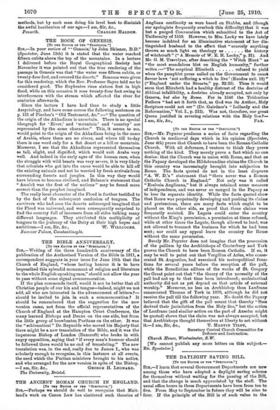[To THE EDITOR OP THE "SrxcrixoR.1 Sin,—Mr. Poynter produces a
series of facts regarding the Church in mediaeval days which in his opinion (Spectator, June 4th) prove that Church to have been the Roman Catholic Church. With all deference, I venture to think they prove nothing of the kind. They merely prove a fact which no one denies : that the Church was in union with Rome, and that as the Papacy developed the Hildebrandine claims the Church in this country was increasingly brought into subjection to Rome. The facts quoted do not in the least disprove "A. W. D.'s " statement that "there never was a Roman Catholic Church in England." Not only was it called " Ecclesia Anglicana," but it always retained some measure of independence, and was never so merged in the Papacy as to lose its separate identity. While the facts quoted show that Rome was perpetually developing and pushing its c!aims and pretensions, there are many facts which ought to be placed on the other side, as proof that these claims were frequently resisted. No Legate could enter the country without the King's permission, a permission at times refused, while at other times the Legate, though allowed to land, was not allowed to transact the business for which he had been sent ; nor could any appeal leave the country for Rome without the same permission.
Surely Mr. Poynter does not imagine that the possession of the pallium by the Archbishops of Canterbury and York proves the Church to have been Roman Catholic. If so, it may be well to point out that Vergilius of Arles, who conse- crated St. Augustine, had exercised his metropolitical func- tions for several years before the reception of the pall, while the Benedictine editors of the works of St. Gregory the Great point out that " the theory of the necessity of the pall had not up to that time been introduced; ecclesiastical authority did not as yet depend on that article of external worship." Moreover, no less an Archbishop than Lanfrano consecrated Thomas of York in 1070, although he did not receive the pall till the following year. No doubt the Papacy believed that the gift of the pall meant that thereby " Sees derived their jurisdiction from the Holy See," but the action of Lanfranc (and similar action on the part of Anselm might be quoted) shows that the claim was not always accepted, but that Archbishops thought themselves at liberty to act without
Secretary Central Church Committee for Defence and Instruction.
Church House, Westminster, S.W.
[We cannot publish any more letters on this subject.— En. Spectator.]






















































 Previous page
Previous page